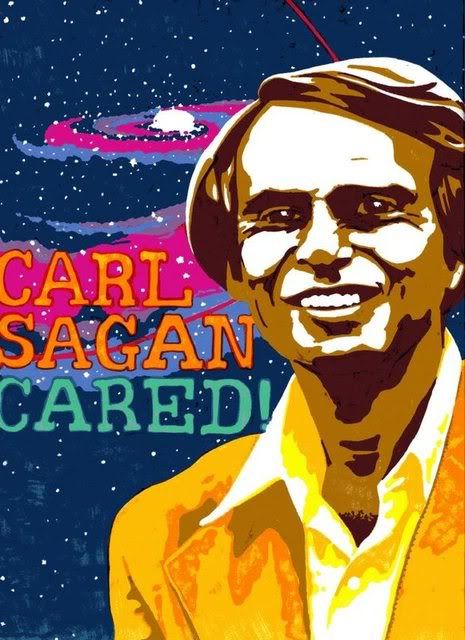I have always been in love with science. I read extensively about paleontology as a kid, about biology as a teen, about linguistics in recent years. Many more branches in between, less extensively but with as much vigor.
Then, not too long ago, I started to read up on Carl Sagan. I must admit that I didn't know who he was for the most part of my life, which may either be due to his not being featured very prominently in the region I hail from or, well, due to my ignorance. Because of certain narcissistic tendencies, let's assume the former to be true.
Anyway, after noticing again and again his name and a certain appreciation for him on the net, I decided to familiarize myself with him as well as his work and purchased The Demon-Haunted World; a book which perfectly fitted with my current interest in certain processes in science.
And oh, I am in love! His appreciation of science seeps through every page. Apart from numerous other statements which elicited my vigorous consent and many more quotes which would make this post crumble under its own weight, he sent my heart all aflutter when he wrote: "This book is a personal statement, reflecting my lifelong love affair with science." It's exactly how I usually describe my relationship with but not restricted to the English language; only I usually add the adjectives 'hot' and 'steamy'.
I cannot wait to read his other books, to look for videos on youtube!
Most importantly, though, the book has reminded me of the beauty of science and knowledge. Like Goethe's Faust we evermore yearn to perceive "was die Welt/Im Innersten zusammenhält". ("whatever holds/The world together in its inmost folds") And damn, we know a lot by now. Most of it mind-blowingly awesome. Mankind has put a man on the moon, cured diseases which robbed parents of their children for centuries, explained the existence of mountains, and - most importantly - invented the internet. We know about dinosaurs, bacteria, and atoms. The shape of the earth is no longer a mystery to us as well as a woman's menstruation. There's still a long way to go and, as much as it pains me to think about it, there have been and continue to be gruesome misuses of science. But to think of what else lies beyond the veil of our current knowledge sends shivers down my spine.
So, celebrate science with me! What do you love most about it? Which branch is your favorite? Which scientist do you think should be the first word of a child?
Hooray for science!
Then, not too long ago, I started to read up on Carl Sagan. I must admit that I didn't know who he was for the most part of my life, which may either be due to his not being featured very prominently in the region I hail from or, well, due to my ignorance. Because of certain narcissistic tendencies, let's assume the former to be true.
Anyway, after noticing again and again his name and a certain appreciation for him on the net, I decided to familiarize myself with him as well as his work and purchased The Demon-Haunted World; a book which perfectly fitted with my current interest in certain processes in science.
And oh, I am in love! His appreciation of science seeps through every page. Apart from numerous other statements which elicited my vigorous consent and many more quotes which would make this post crumble under its own weight, he sent my heart all aflutter when he wrote: "This book is a personal statement, reflecting my lifelong love affair with science." It's exactly how I usually describe my relationship with but not restricted to the English language; only I usually add the adjectives 'hot' and 'steamy'.
I cannot wait to read his other books, to look for videos on youtube!
Most importantly, though, the book has reminded me of the beauty of science and knowledge. Like Goethe's Faust we evermore yearn to perceive "was die Welt/Im Innersten zusammenhält". ("whatever holds/The world together in its inmost folds") And damn, we know a lot by now. Most of it mind-blowingly awesome. Mankind has put a man on the moon, cured diseases which robbed parents of their children for centuries, explained the existence of mountains, and - most importantly - invented the internet. We know about dinosaurs, bacteria, and atoms. The shape of the earth is no longer a mystery to us as well as a woman's menstruation. There's still a long way to go and, as much as it pains me to think about it, there have been and continue to be gruesome misuses of science. But to think of what else lies beyond the veil of our current knowledge sends shivers down my spine.
So, celebrate science with me! What do you love most about it? Which branch is your favorite? Which scientist do you think should be the first word of a child?
Hooray for science!







 But of course, Fred Harris too!
But of course, Fred Harris too! 